Students, join the band
Be more than a fan.
You don’t need to create a rap CV or resume to get an internship at Spotify. Show us who you are, what you care about, and where you want to go - we’ll show you the rest.
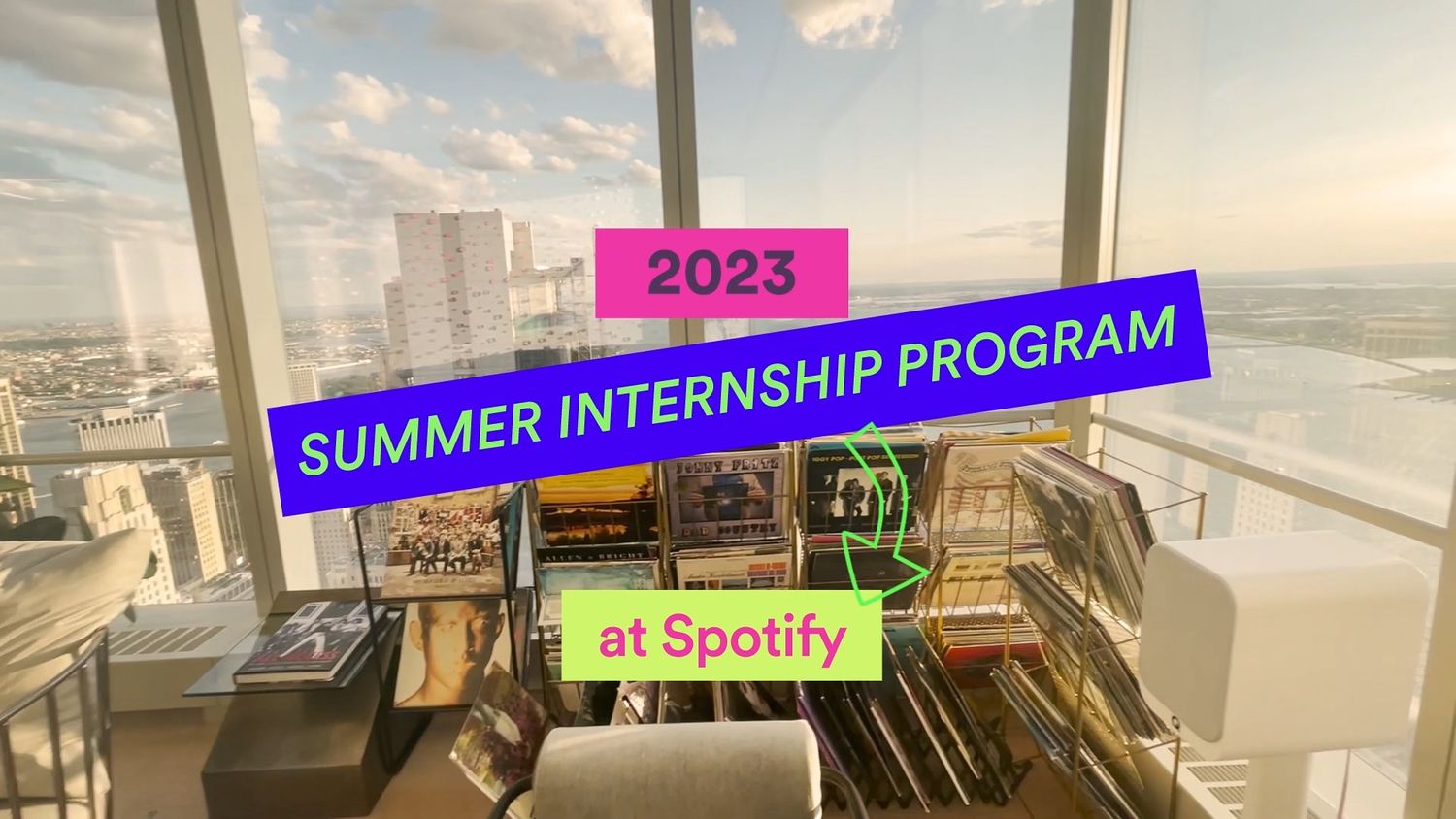
Intern Highlights 2023
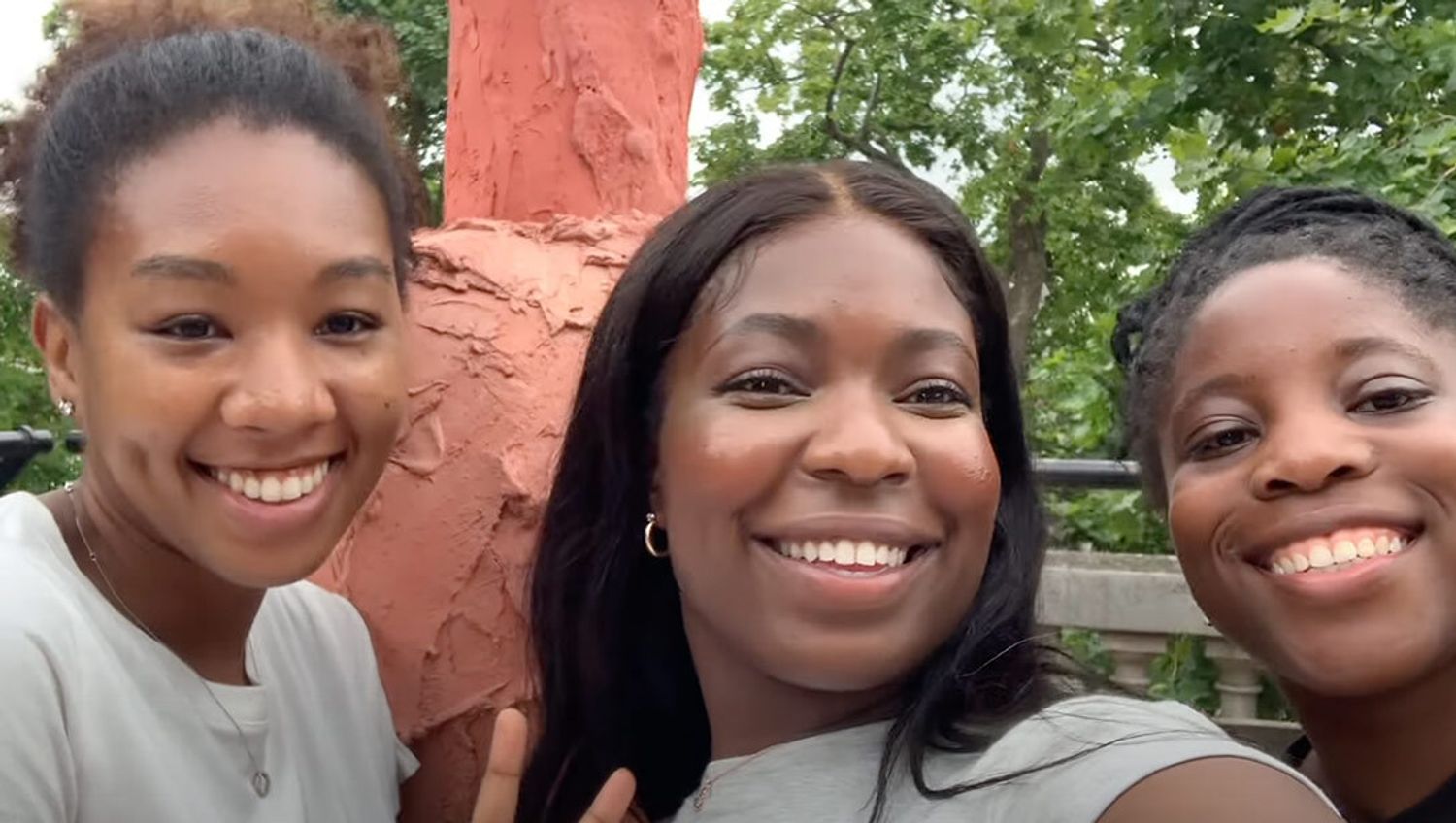
Intern Highlights 2022
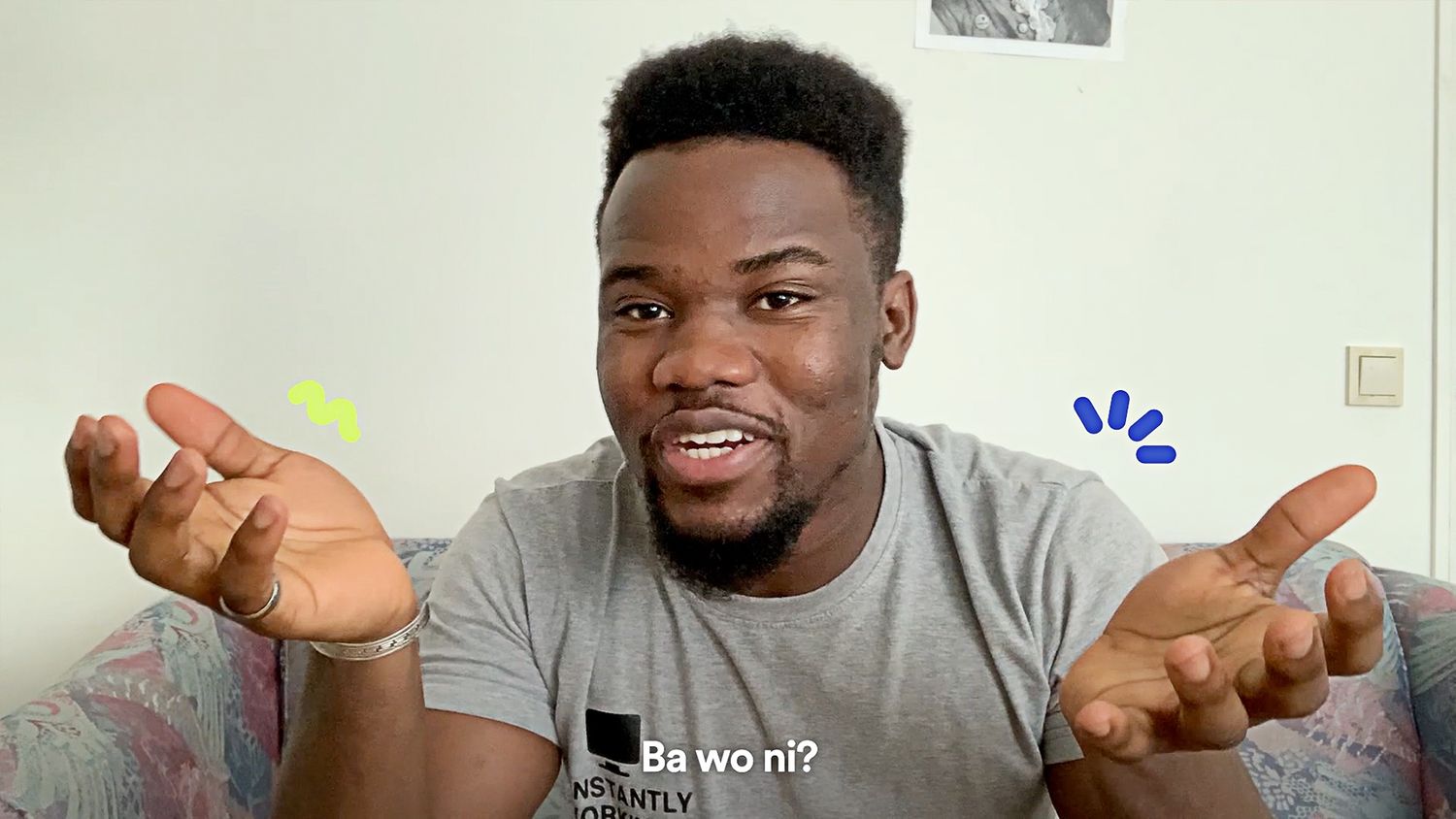
Intern Highlights 2021
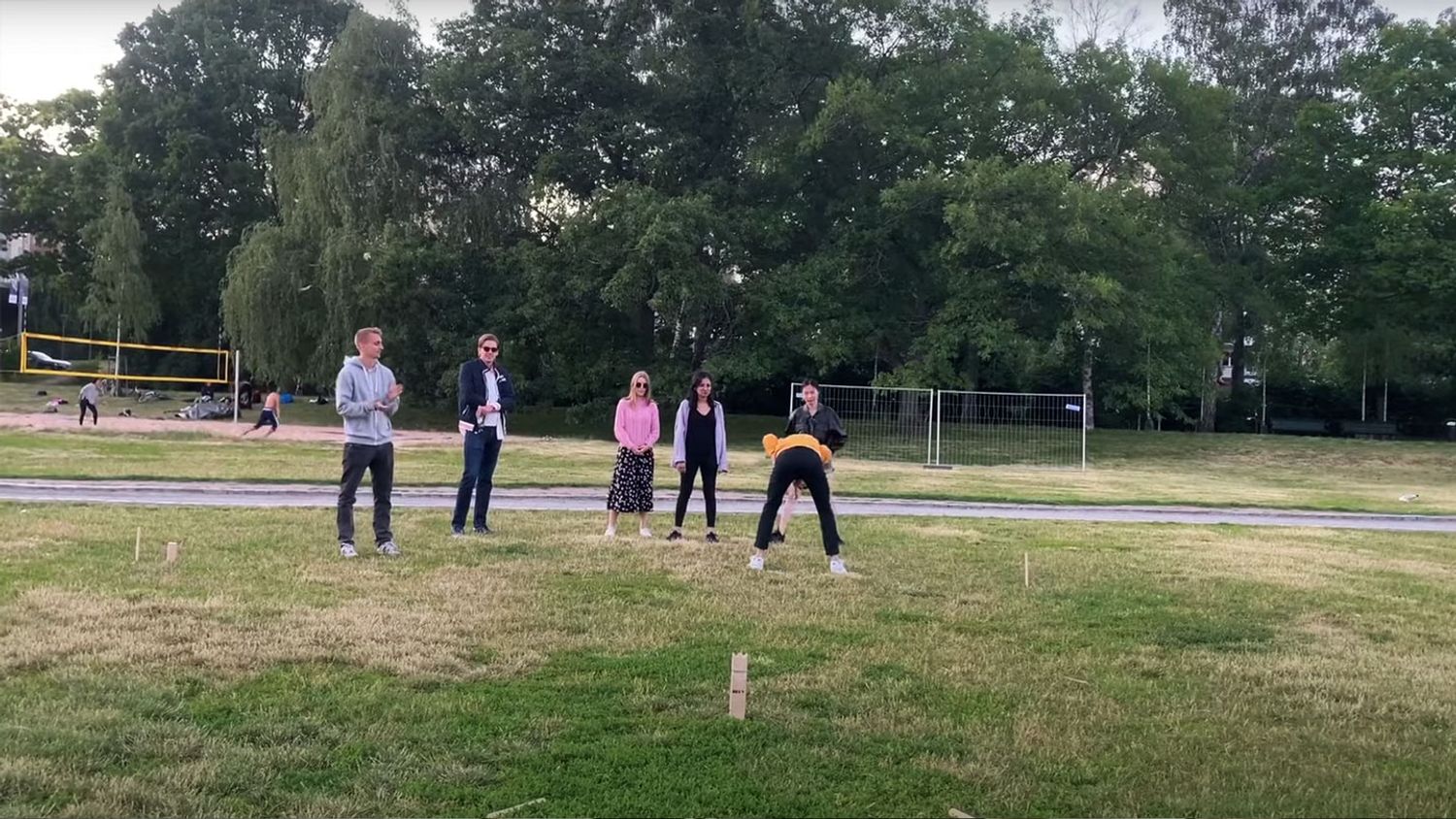
Intern Highlights 2020
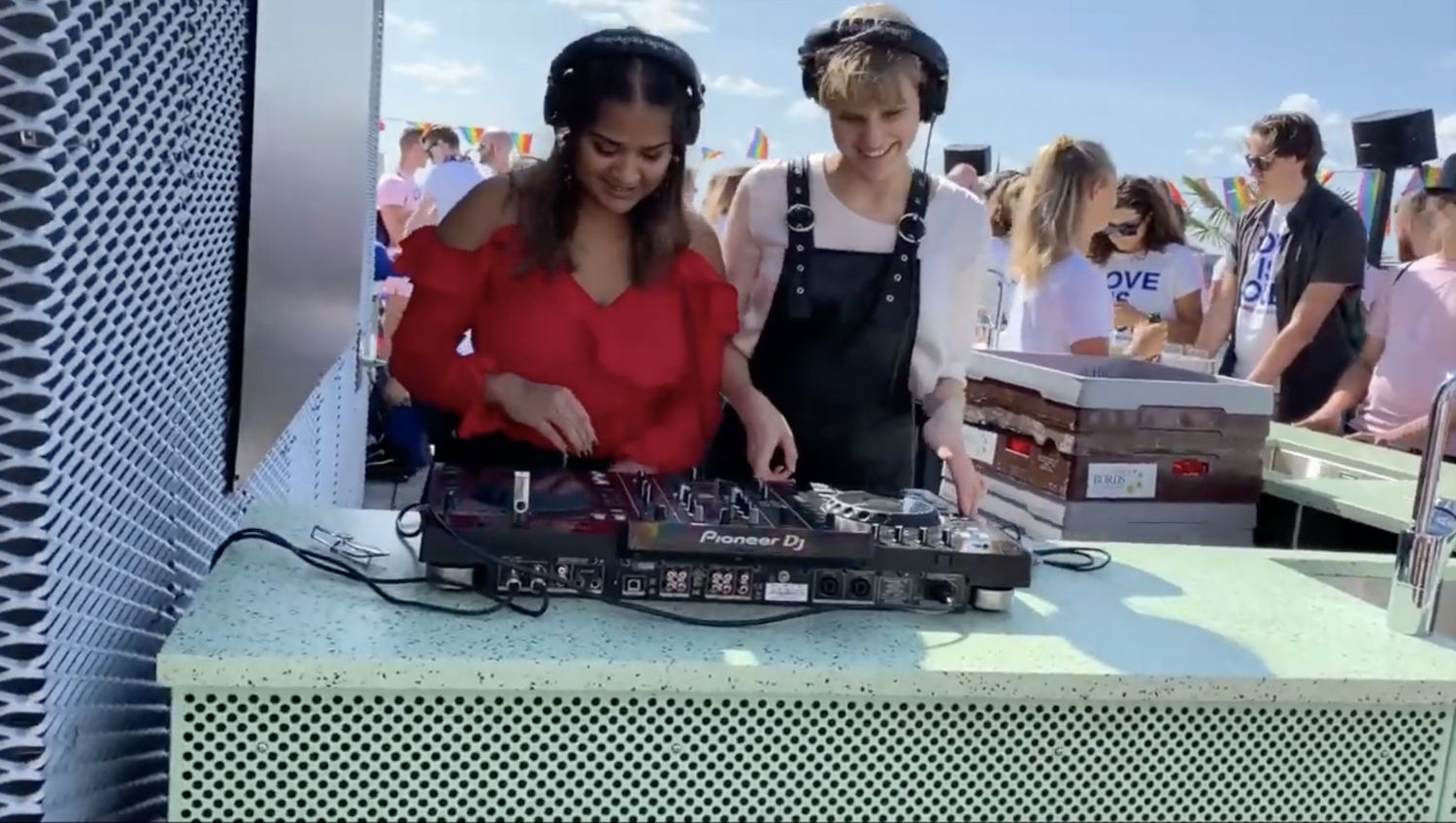
Intern Highlights 2019

Do more than you thought
Our student programs are anything but conventional. You’ll be right at the heart of major projects, working with teams of passionate people and helping us to create the next awesome thing. What’s more, you’ll be making a real impact on our business, and the world.
What we offer
10 weeks, over summer
Global Summer Internship Program
We offer a huge range of opportunities across our business, product and technical teams, and the chance to make a direct impact on how we amplify the voices of creators and inspire and entertain the world. Internship spots are available in multiple locations around the world.
Summer 2024 applications are open between February 29th and March 15th
Fresh opportunities
Hang on, just getting the latest stats...
0 jobs in all locations in all categories

Curious about life at Spotify? Queue up the Life at Spotify podcast and get a behind the scenes view of what being a band member really is all about.

Be the first to know about new job opportunities and events for students. Connect with our Talent Community today.
Still curious?
What is the duration of summer internships @ Spotify?
For the summer of 2024, internships will last for 10 weeks, beginning June 10th and ending on August 16th.
What locations will interns be based in this summer?
For the summer of 2024, we’re only accepting interns who can join us in our offices in London, Stockholm and NYC. There is no option to participate in our Global Internship Program remotely this summer. To check the location for specific roles, have a look at the job descriptions.
What is the summer internship recruitment timeline?
Our 2024 internships are opening on February 29th and applications will remain open until March 15th. We will evaluate all candidates after our application deadlines. Our interview process will take place in March and April.
Who is eligible for the summer internship program?
Students graduating in 2024 and 2025, pursuing Associates, Bachelor’s, Master’s, & PhD degrees as well as bootcamp certifications.
Do you accept applications that are received after the application deadline?
We do not accept any applications that come in after our designated deadline of March 15th
Do I have to be referred by a Spotify employee to apply or be considered for an internship?
No, we make sure each candidate that applies gets full consideration in the process.
Can I apply for early career programming via email or LinkedIn messages?
We only accept applications via our official Spotify Jobs site. Please ensure you’ve submitted an application directly to an active posting.
Can I schedule an informational interview with a team member?
While we’d love to chat and meet the students who are passionate about joining Spotify, we are unfortunately unable to schedule pre-interview informational conversations. The best way to learn more is to submit your application officially, and be contacted via a recruiter.
Are summer internships rotational?
Our summer internships are not rotational. Rather, you are placed on one team which you will work with during the duration of your 10 weeks at Spotify.
Are Spotify internships paid?
How can I stand out in my application and in the interview process?
Firstly, do your research and let us know why you are interested in Joining the Band! While not required, we love to see cover letters, portfolios and personal websites in addition to your resume to give us a better sense of who you are, your experience and what you are passionate about! Pay close attention to our different job descriptions and apply to only the ones that you are interested in and that align with your background!
If I want to get data and information for my research, what do I do?
You can find publicly available data at any of the following sites:
- Developer.spotify.com
- Spotify.design
- Research.spotify.com
- News.spotify.com
- Backstage.io
- Investors.spotify.com
- Spotifycodes.com
Can I interview someone from Spotify for my thesis?
Unfortunately, we are unable to schedule any interviews, share surveys across the company, or give out non-public information. There are however five different sites where you can get publicly available data and information from us where you can find out more about the topics you are interested in. You can find publicly available data at any of the following sites:
Can I write my (bachelor/master) thesis at Spotify?
Currently, we do not have a formal master thesis program. Should you connect with a team via your own networking that is interested in working with you on your thesis, we will consider your proposal and connect with you on next steps. Currently, we do not accept master thesis proposals via email or via our recruitment team.
I’m in high school - can I intern at Spotify (if only for a few days)?
Unfortunately, we do not currently offer any internships for high school students.
Can I / my school / my students / my org visit an Spotify office?
Due to a high volume of requests, we are not currently taking any requests for office tours/visits.
What do you do to promote Diversity, Equity, Inclusion, & Belonging at Spotify?
Spotify’s committed to building a diverse workforce that is reflective of the creators, artists, and consumers on the platform. We aim to empower our teams to do their best work. You can read more here about our commitment to Diversity, Equity, Inclusion, and Belonging.

Still at school?
We’re thrilled you’re thinking of a career in our industry and are interested in all things Spotify. Whilst we’re not running any internships or programs for primary school or high school students right now, why not check out our Spotify for Developers site to learn more about our platform?
Quick clicks
Discover more about our categories
Read about diversity, equity & impact
Diversity, equity & impact
Read about being here
Master's thesis – Spotify
Spotify forever changed the way we think of music when releasing their music streaming platform. Their huge success has inevitably lead to big competitors like Apple, Amazon and Google to step up their game and enter the fight for listeners. Being a fast-growing product company like Spotify, with a fleet of 250 (and counting) autonomous teams in an agile environment, means great potential in terms of what can be done. However, steering the vessel becomes trickier for each additional team and demands more from the organizational structure, as well as from the suite of technical solutions. The Platform Developer Experience tribe at the company, with an overall goal of providing the best possible conditions for these teams to perform well, suspects that this autonomous set-up creates bottlenecks, ultimately hindering the end-to-end productivity. This tribe wanted us to find and better understand these bottlenecks, and furthermore to design and present features of an enterprise software aiding in their elimination. What: User research / Product design When: January 2020 - June 2020
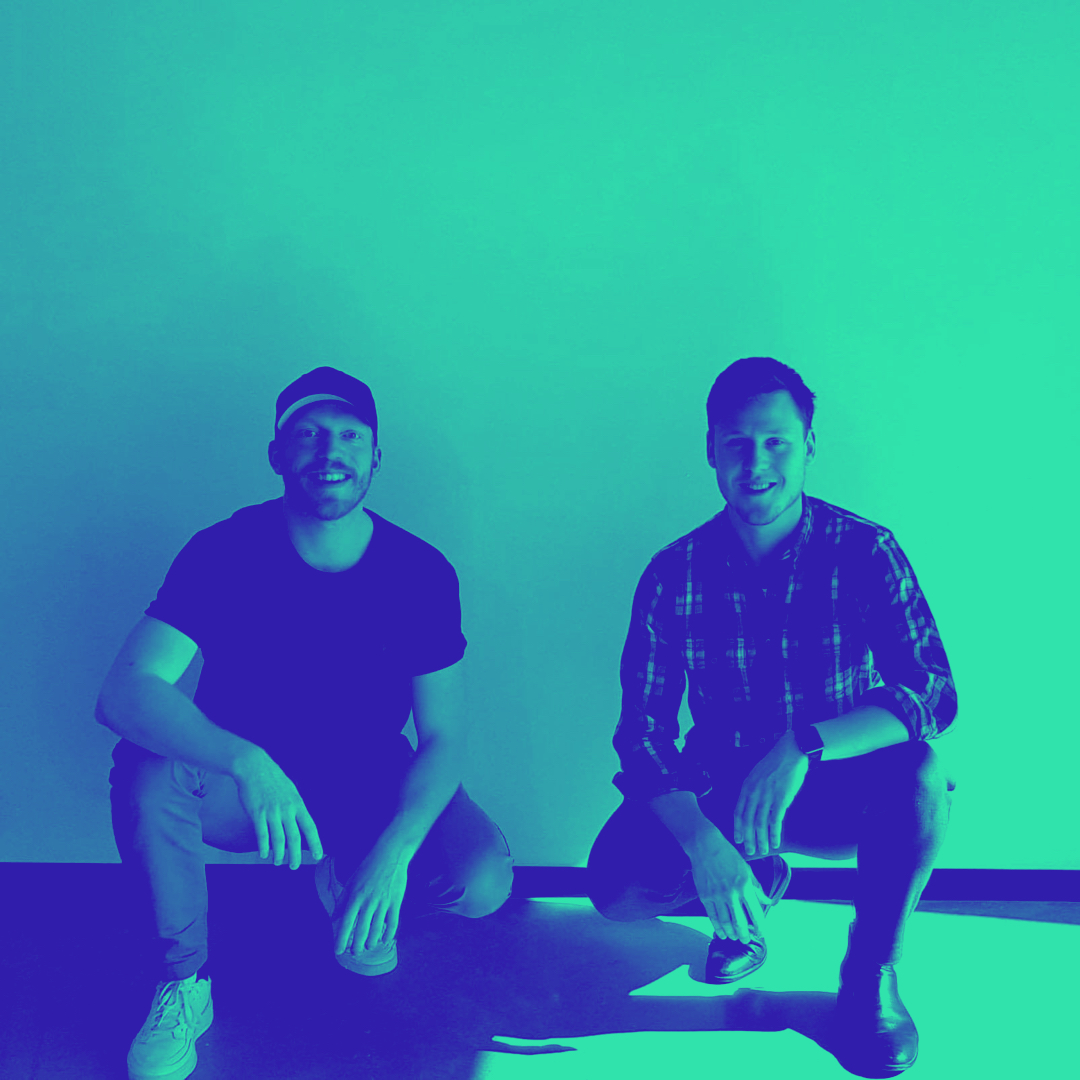
Project preparation
The project started by talking to several stakeholders to understand their expectations and view on the project to be carried out. Given the limited time frame of the project and the expected deliverables from Spotify’s side, as well as from Chalmers, a time plan had to be mapped out, including internal deadlines making sure we progressed as planned. The idea was to go through a full design thinking cycle, with an etnographic lense guiding the chosen methods for each phase.
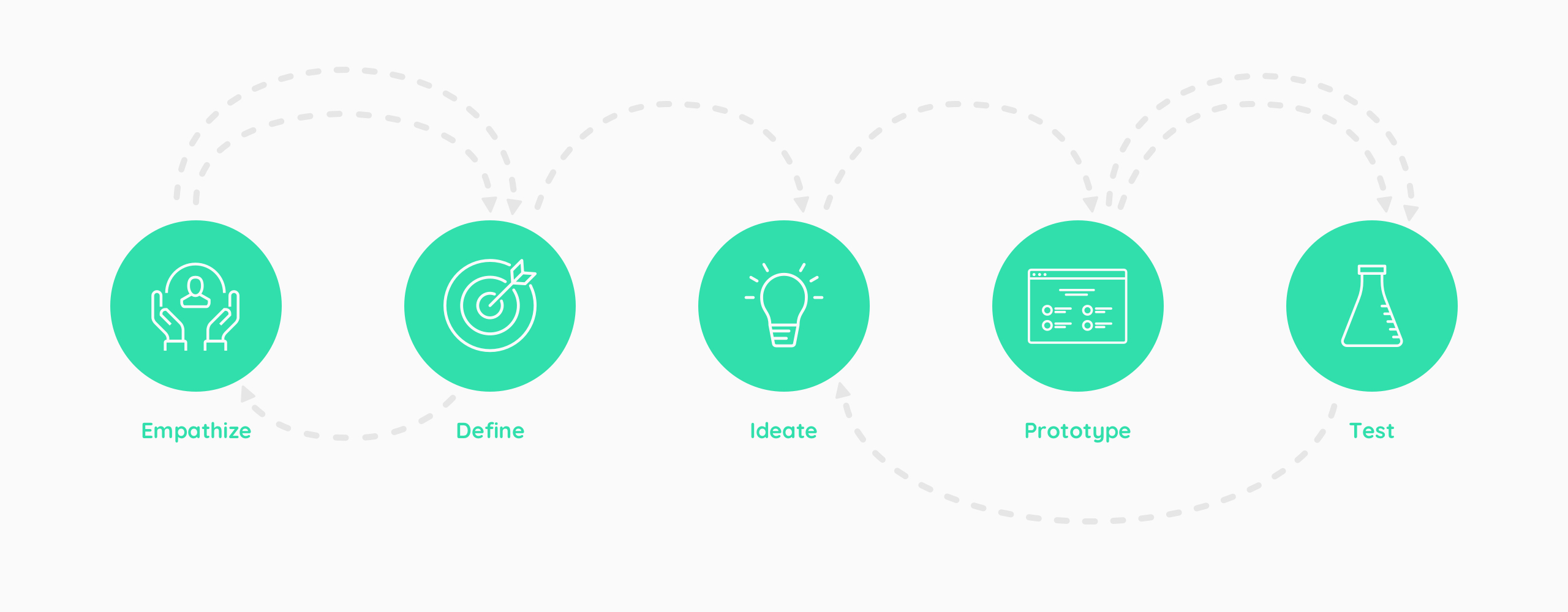
User research
In order to fully understand and to be able to map out the problem space of productivity blockers, a thorough data collection had to be done. Since the users and target group of our study was developers of Spotify, it meant we had to talk to them. A lot of them. This was done primarily through semi-structured interviews, contextual inquiries and focus groups. The latter was considered more fruitful since it allowed several users to elaborate on each others ideas and it opened up for additional perspectives of a given topic. An important aspect, initially expressed by Spotify, was to talk to a wide spectrum of developers; ranging in tenure, coming from different discplines and office sites.
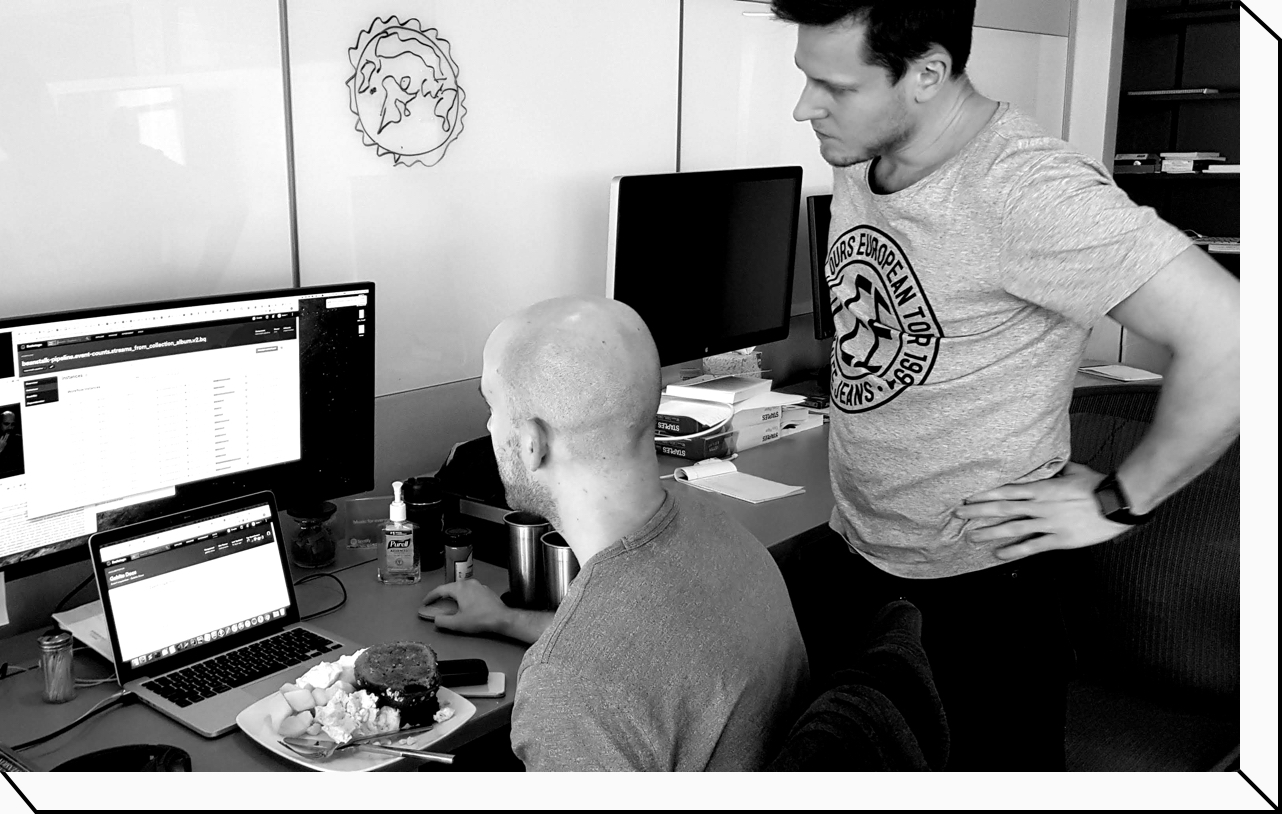
Trip to Manhattan
To not risk capturing a new ”Stockholm syndrome”, we traveled across the Atlantic to Spotify's office site in New York. During our visit, we ran additional interviews, focus groups and guerrilla research sessions across the different floors in 4 World Trade Center. We also got the chance to present our initial findings to the Platform Developer Expeirence teams based in New York. This opened up the chance for them to give feedback and further feed our knowledge of the problem space.

Data collected from 49 different developers was transcribed and analysed using affinity diagramming and thematic analysis. Quotes addressing similar issues were clustered and themes started to emerge. To risk mitigating bringing biases to the table, this was done seperately between the two of us for the first few transcriptions. The results were then compared and a shared code book was created to use on the rest of the data. The larger themes were evaluated based on their predicted return of investment (ROI) and impact. After close discussions with the main stakeholders, it was decided to move forward with the problem of code exploration & evaluation – one of the sub-problems of the umbrella theme Discoverability .
Problem statement
Developers have different ways of approaching exploration of code and reusable components, arguably because they are coming from different verticals and are writing different kinds of business code. But there seemed to be some shared issues that made the situation a lot trickier. In short, the problem of code exploration & evaluation could be divided to four fundamental issues, namely:
- It is difficult determining best practice exemplar.
- It is problematic to find example code.
- The current Spotify search tools are inadequate.
- Developers are missing a natural marketplace for reusables.
The lay as much of a good foundation as possible for the ideation phase, it was necessary to convert the problem of code exploration & evaluation to an actionable problem statement using Point of Views (POVs) and How might we questions. These were the two POVs brought forward:
- Developers at Spotify need to be able to more easily discover reusable code components because it would prevet them from having to reinvent the wheel.
- Developers at Spotify need to be able to evaluate code because it would help them in their choice of which code to utilize.
Using Crazy 8's and the POVs, we created a myriad of different ideas to explore the solution space. Despite having come up with a few promising ideas, we decided to invite a few developers and stakeholders to the ideation in a remote design workshop. What followed was the work of merging, abandoning and refining ideas. Once three concrete ideas had made it through the screening, six design critique sessions were held with developers. During theses sessions, the ideas were presented briefly and some low fidelity paper prototypes were shown. A discussion regarding their general thoughts and concerns followed, and these opinions were used as support when deciding the idea to proceed with.

The Use Case Marketplace
The idea we decided to move forward with was a new concept called The Use Case Marketplace . The idea is quite simple, instead of trying to find reusable code components through their names, which many times are arbitrary and far from descriptive, the developers can now discover reusables via a new storefront; namely their use case and intended functionality. This way, we utilize what the developers already know when starting their search journey, that is, what they are looking to do and what functionality they need, and remove the current necessity of knowing the name of the reusable. The concept was prototyped and taken from a low fidelity to a medium fidelity state. The medium fidility prototype was then user tested and evaluted with six Spotify developers. The developers were taken through a discovery journey of trying to find a use case, see picture below. The focus of the tests were to examine the usability and the test participants’ overall perception of the concept as a whole; was this something the developers could see themselves use? One of the major learnings was the need to rethink how a developer narrows down the number of results. Being able to add addtional filter chips both through the search bar and via the dropdown menus was percieved as confusing and needed to be addressed for the final prototype. Overall, the learnings from the tests were used to iterate and tweak the concept before taking it to a high fidelity state.
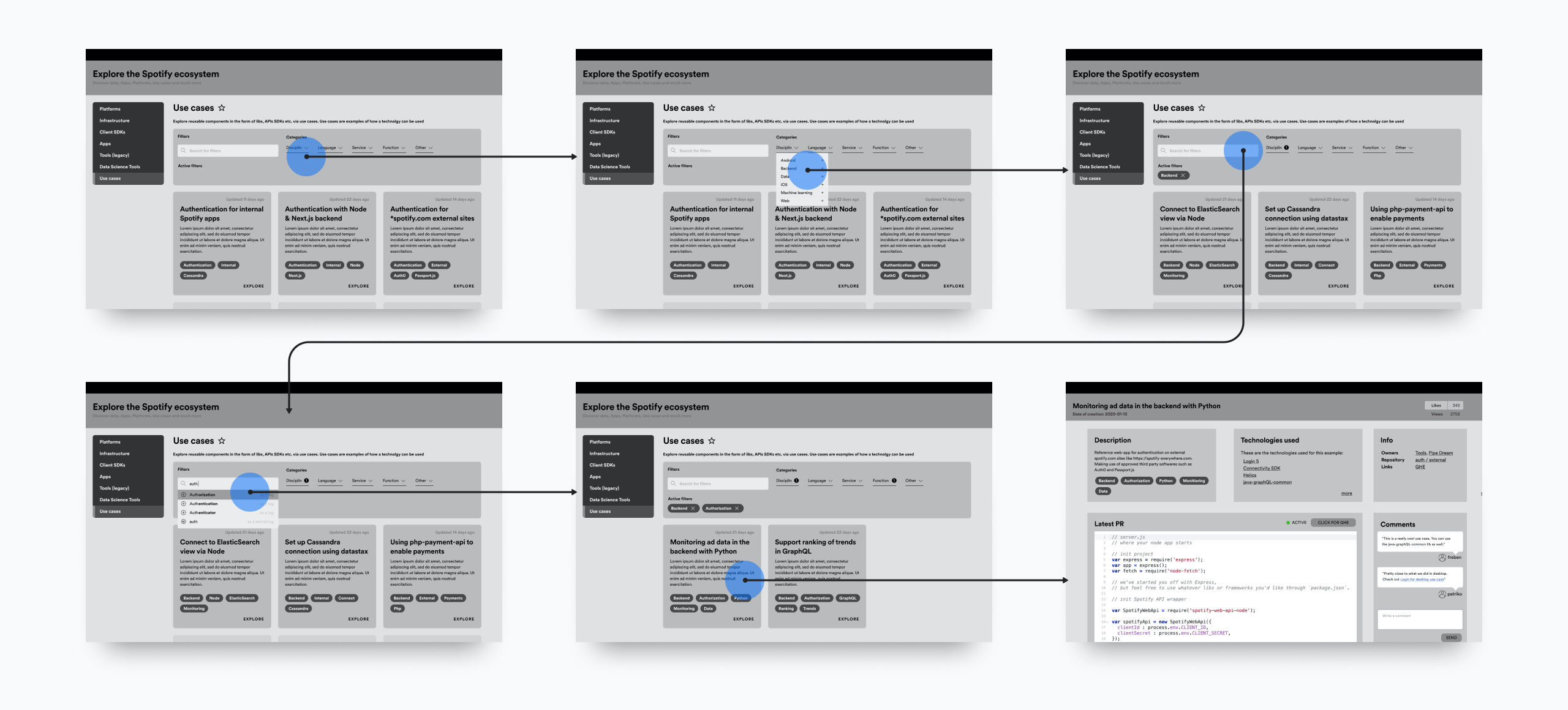
Final prototype
The Use Case Marketplace concept consists of two parts: (1) the marketplace where the developers search for and find potentially useful use cases, and (2) the use case page itself where the developer would read up on the use case.
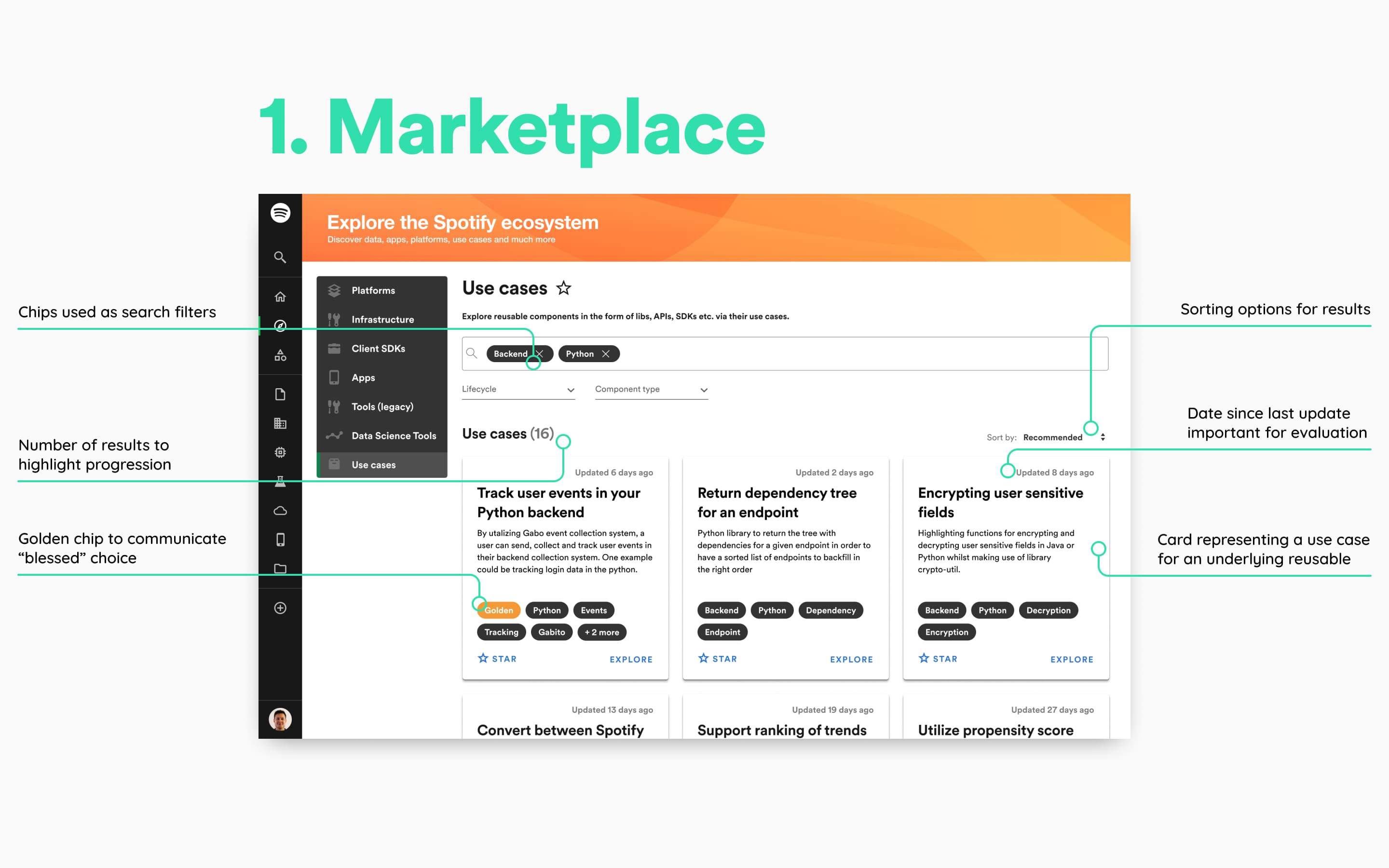
Searching for use cases
A developer narrows down the number of use cases by adding keyword-based chips in the search bar, describing what functionality they are looking to achieve and the current constraints they have. The system then presents the developer with several cards, each representing a use case matching the specified chips.
The final concept was presented for Spotify stakeholders in the begin of June and was very well perceived. The future of the concept remains unclear, but the work to put more focus on discoverability across the Spotify ecosystem has already started. Alongside the final concept, 15 user experience factors to consider when designing for discoverability in enterprise software was extracted and served as the main result for the academia and the final thesis report. If you are interestest in the report and the 15 factors, feel free to let me know and I will share the report with you.
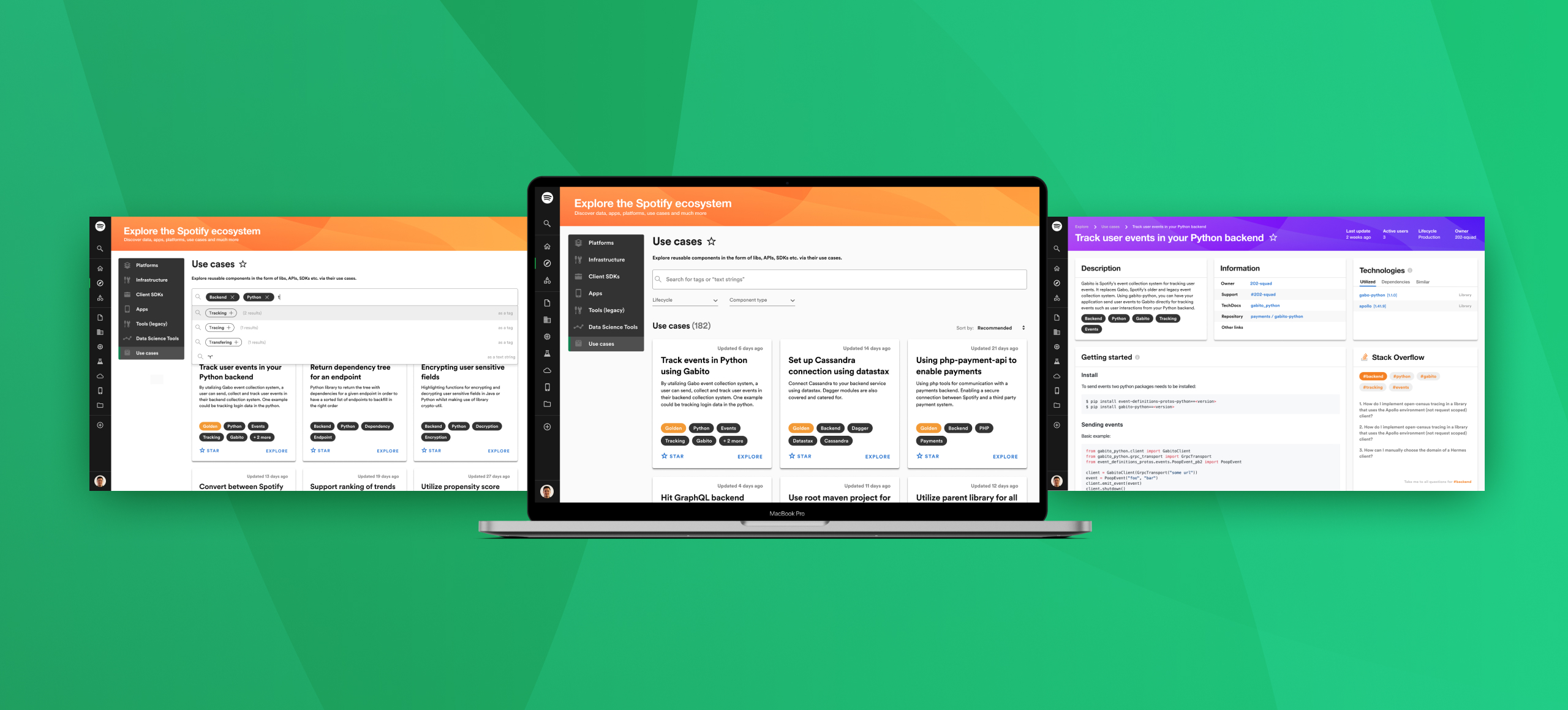
Android Police
Spotify tackles youtube music head-on with music videos.
It’s a limited release for now, but Spotify has big plans
- Spotify is rolling out music videos to Premium subscribers in select regions.
- The feature allows switching between audio and video, though it's limited to a few titles only for now.
- Videos can be watched in portrait or landscape, and there are the usual playback and skipping buttons available.
For all its early flaws, there has always been one key feature YouTube Music stands for long before anyone else: access to all the music videos. With Spotify’s latest announcement, this advantage might soon fizzle out, though. The Swedish streaming giant has announced that it will start rolling out music videos in beta for select regions and titles.
Starting today, Spotify is rolling out music videos to some of its paid subscribers. The videos available across all platforms, whether it’s iOS, Android, a desktop, or a TV. In this early pilot phase, there is only a small selection of music videos, among them videos from Ed Sheeran, Doja Cat, Ice Spice, Aluna, and Asake.
What is Spotify? Music, pricing, features, and free-tier explained
Supported titles will show a new “Switch to Video” toggle in the Now Playing view that will start the video from the beginning. Switching back to audio seems more seamless, though. Spotify writes, “Want to return to background listening? Simply press ‘Switch to Audio.’” You can watch the video in landscape, and there are buttons for skipping back and forth by 15 second increments.
For now, Spotify is rolling out music videos to a few select regions only: UK, Germany, Italy, the Netherlands, Poland, Sweden, Brazil, Colombia, Philippines, Indonesia, and Kenya are on board. Given that it’s a staged rollout, it may still take a while to reach your Premium account even if you live in one of these countries.
Spotify makes clear that it could still tweak how the feature works based on feedback from artists and users over the course of the beta. The company ends its announcement with a statement that suggests we may not have to wait too long for music videos to arrive in more regions: “Stay tuned as we hope to expand the catalog of music videos and bring the feature to more users and countries.”
Spotify and YouTube aren’t the only app to offer music videos
Music videos have long become a popular part of other services.
While YouTube Music has a close association with music videos just based on its brand and history, it’s not the only music streaming service that has offered videos so far. For example, Tidal is another big service that gives you access to a big catalog of music videos, just like Apple Music does, too. There are also dedicated services like Vevo that specialize in videos.
In that sense, Spotify is late to the party. Given that it’s the most popular music streaming service out there, it may still help give music videos even more prominence than they already have on other platforms.

World Conference on Information Systems and Technologies
WorldCIST 2021: Trends and Applications in Information Systems and Technologies pp 337–352 Cite as
Keeping the Beat on: A Case Study of Spotify
- Inês Gomes 19 ,
- Inês Pereira 19 ,
- Inês Soares 19 ,
- Mariana Antunes 19 &
- Manuel Au-Yong-Oliveira 20
- Conference paper
- First Online: 29 March 2021
3332 Accesses
3 Citations
Part of the book series: Advances in Intelligent Systems and Computing ((AISC,volume 1366))
The music industry has faced a tremendous change ever since the emergence of streaming. People now had access to unlimited music to listen to and share with others, which is a great concept. As companies started to invest in the future of streaming, many platforms were created, one of them being Spotify. Standing amidst a crowd of competitors, Spotify managed to climb to the top and comfortably remain there over the years (listed on the NYSE and having 120 employees; IPO share price (3 rd April 2018) = 169.9 US Dollars and share price of 319.77 US dollars on 4 th December 2020). However, it was not easy. Being one of the top streaming platforms in the industry requires effort, investment, adaptation and innovation, and exceptional management. This study analyses in-depth the aforementioned aspects, as well as the company’s business models and its revenue, which combined, led Spotify to where it is today. A survey with 498 answers was performed regarding Spotify, and the results were analyzed by using descriptive and inferential (Chi-Square test) statistics. We thus conclude very confidently that there does seem to be an association (statistically significant at the 0.1% level) between age and the use of Spotify. Younger respondents (18–35 years) are more likely to use Spotify than older respondents (> 35 years). Overall, Spotify’s business model is one of the best in its field and is constantly evolving, which is what is to be expected of a company that seeks the top spot on the podium.
- Streaming platforms
- Business models
This is a preview of subscription content, log in via an institution .

Buying options
- Available as PDF
- Read on any device
- Instant download
- Own it forever
- Available as EPUB and PDF
- Compact, lightweight edition
- Dispatched in 3 to 5 business days
- Free shipping worldwide - see info
Tax calculation will be finalised at checkout
Purchases are for personal use only
Kaimann, D., Tanneberg, I., Cox, J.: “I will survive”: online streaming and the chart survival of music tracks. Managerial and Decision Economics, pp. 1–18 (2020)
Google Scholar
IFPI: Global Music Report (2019). https://www.ifpi.org/ifpi-global-music-report-2019/ . Accessed 28 Oct 2020
Fly, B.: How does music consumption impact the music industry and benefit artists? Accounting Undergraduate Honors Theses 20 (2016)
Carroni, E., Paolini, D.: Business models for streaming platforms: content acquisition, advertising, and users. Inf. Econ. Policy 52 , 1–13 (2020)
Article Google Scholar
Lee, M., Choi, H.S., Cho, D., Lee, H.: Can digital consumption boost physical consumption? The effect of online music streaming on record sales. Decis. Support Syst. 135 (6), (2020)
Magaudda, P.: When materiality “bites back”: digital music consumption practices in the age of dematerialization. J. Consum. Cult. 11 (1), 15–36 (2011)
Wikström, P.: The Music Industry in an Age of Digital Distribution. OpenMind. https://www.bbvaopenmind.com/en/articles/the-music-industry-in-an-age-of-digital-distribution/ . Accessed 11 May 2020
Murphy, S.: Here’s how music consumption has changed over the last decade. The Music Network. https://themusicnetwork.com/music-consumption-decade/ . Accessed 02 Nov 2020
Kingsnorth, S.: Digital Marketing Strategy: An Integrated Approach to Online Marketing. Kogan Page, London (2016)
Khong, T.: Customer perceived value freemium business model: Case study: Spotify in Finnish and Vietnamese markets (Master’s Thesis in Economics and Business Administration Master’s, University of VAASA) (2019)
Kim, J., Nam, C., Ryu, M.H.: What do consumers prefer for music streaming services?: A comparative study between Korea and the US. Telecommun. Policy 41 (4), 263–272 (2017)
Aguiar, L.: Let the music play? Free streaming and its effects on digital music consumption. Inf. Econ. Policy 41 , 1–14 (2017)
Pelusi, M.: Napster Is Released. Salem Press Encyclopedia. http://widgets.ebscohost.com/prod/customerspecific/ns000290/authentication/index.php?url=https%3a%2f%2fsearch.ebscohost.com%2flogin.aspx%3fdirect%3dtrue%26AuthType%3dip%2cshib%2cuid%26db%3ders%26AN%3d89315521%26lang%3dpt-pt%26site%3deds-live%26scope%3dsite . Accessed 30 Oct 2020
Aversa, P., Hervas-Drane, A., Evenou, M.: Business model responses to digital piracy. Calif. Manag. Rev. 61 (2), 30–58 (2019)
Zennyo, Y.: Freemium competition among ad-sponsored platforms. Inf. Econ. Policy 50 , (2020)
Farmbrough, H.: How This Swedish Venture Capitalist Became Spotify’s Lead Investor. https://www.forbes.com/sites/heatherfarmbrough/2018/03/27/how-this-swedish-venture-capitalist-became-spotifys-lead-investor/?sh=4bfd2e469075 . Accessed 04 Nov 2020
Stassen, M.: New Spotify Patent Sheds More Light On Potential Karaoke Mode – Including Auto-Tuned Vocals - Music Business Worldwide. Music Business Worldwide. https://www.musicbusinessworldwide.com/new-spotify-patent-sheds-more-light-on-potential-karaoke-mode-including-auto-tuned-vocals/ . Accessed 04 Nov 2020
Spotify AB, Stockholm (SE): Methods and Systems for Overlaying and Playback of Audio Data Received from Distinct Sources. U.S. Patent 10,771,521 B2 (2020)
Spotify AB, Stockholm (SE): Methods and Systems for Personalizing User Experience Based on Personality Traits. U.S. Patent 10, 798,214 B2 (2020)
Stassen, M.: Spotify Has A Patent For Personality Tracking Technology –And It’s Pretty Creepy Stuff - Music Business Worldwide. Music Business Worldwide. https://www.musicbusinessworldwide.com/spotify-has-a-patent-for-personality-tracking-technology-and-its-pretty-creepy/ . Accessed 10 Nov 2020
Cuofano, G.: How does Spotify make money? Spotify Freemium Business Model in a Nutshell. https://fourweekmba.com/spotify-business-model/ . Accessed 04 Nov 2020
Spotify. Audio-First - Spotify. https://newsroom.spotify.com/2019-02-06/audio-first/ . Accessed 11 Nov 2020
Perez, S.: Techcrunch is now a part of verizon media. https://techcrunch.com/2020/07/21/spotify-launches-video-podcasts-worldwide-starting-with-select-creators/?guccounter=1 . Accessed 11 Nov 2020
Carman, A.: Spotify is testing video podcasts with two youtube stars. https://www.theverge.com/2020/5/6/21249389/spotify-video-podcast-test-upload-content-test-youtube . Accessed 11 Nov 2020
Spotify. Spotify’S Biggest Playlist, Today’S Top Hits, Celebrates 25 Million Followers — Spotify. https://newsroom.spotify.com/2019-12-16/spotifys-biggest-playlist-todays-top-hits-celebrates-25-million-followers/ . Accessed 04 Nov 2020
Google Cloud. Spotify Case Study| Google Cloud. https://cloud.google.com/customers/spotify . Accessed 04 Nov 2020
Desai, M.: How Spotify makes Money - Business Model. https://medium.com/dissecting-music-tech/how-spotify-makes-money-business-model-ca0a71a19163 . Accessed 10 Nov 2020
Spotify. Listening Is Everything. https://www.spotify.com/pt/premium/?checkout=false#PLANS . Accessed 10 Nov 2020
Ads.spotify.com. Soluções De Publicidade| Spotify Advertising. https://ads.spotify.com/pt-BR/experiencias-publicitarias/ . Accessed 10 Nov 2020
Kakar, K.: How Spotify Works: Business Model and Revenue Streams. https://insights.daffodilsw.com/blog/how-spotify-works-business-model-and-revenue-streams . Accessed 10 Nov 2020
Seitz, P.: https://www.investors.com/news/technology/spot-stock-buy-now/ . Accessed 14 Nov 2020
Richter, F.: Infographic: Will Music Streaming Ever Be Profitable? Statista Infographics. https://www.statista.com/chart/577/revenue-and-net-loss-of-pandora-and-spotify/ . Accessed 10 Nov 2020
Business Wire. Spotify Technology S.A. Announces Financial Results for Fourth Quarter of (2018). https://www.businesswire.com/news/home/20190206005298/en/Spotify-Technology-S.A.-Announces-Financial-Results-Fourth . Accessed 10 Nov 2020
Oakshott, L.: Essential Quantitative Methods - for Business, Management, and Finance. 6th edn. Macmillan International Higher Education, London (2016)
Saunders, M.N.K., Cooper, S.A.: Understanding Business Statistics – An Active-Learning Approach. The Guernsey Press, Guernsey (1993)
Bryman, A., Bell, E.: Business Research Methods, 4th edn. Oxford University Press, Oxford (2015)
Statista – Share of Spotify users in the United States as of March 2018, by age. https://www.statista.com/statistics/475821/spotify-users-age-usa/ . Accessed 06 Dec 2020
PORDATA – National minimum wage – monthly figure (PPS). https://www.pordata.pt/en/DB/Europe/Search+Environment/Table . Accessed 28 Dec 2020
Download references
Author information
Authors and affiliations.
Department of Languages and Cultures, University of Aveiro, 3810-193, Aveiro, Portugal
Inês Gomes, Inês Pereira, Inês Soares & Mariana Antunes
INESC TEC, GOVCOPP, Department of Economics, Management, Industrial Engineering and Tourism, University of Aveiro, 3810-193, Aveiro, Portugal
Manuel Au-Yong-Oliveira
You can also search for this author in PubMed Google Scholar
Corresponding author
Correspondence to Manuel Au-Yong-Oliveira .
Editor information
Editors and affiliations.
ISEG, University of Lisbon, Lisbon, Portugal
Álvaro Rocha
College of Engineering, The Ohio State University, Columbus, OH, USA
Hojjat Adeli
Institute of Data Science and Digital Technologies, Vilnius University, Vilnius, Lithuania
Gintautas Dzemyda
DCT, Universidade Portucalense, Porto, Portugal
Fernando Moreira
Department of Information Sciences, University of Sheffield, Lisbon, Portugal
Ana Maria Ramalho Correia
Rights and permissions
Reprints and permissions
Copyright information
© 2021 The Author(s), under exclusive license to Springer Nature Switzerland AG
About this paper
Cite this paper.
Gomes, I., Pereira, I., Soares, I., Antunes, M., Au-Yong-Oliveira, M. (2021). Keeping the Beat on: A Case Study of Spotify. In: Rocha, Á., Adeli, H., Dzemyda, G., Moreira, F., Ramalho Correia, A.M. (eds) Trends and Applications in Information Systems and Technologies . WorldCIST 2021. Advances in Intelligent Systems and Computing, vol 1366. Springer, Cham. https://doi.org/10.1007/978-3-030-72651-5_33
Download citation
DOI : https://doi.org/10.1007/978-3-030-72651-5_33
Published : 29 March 2021
Publisher Name : Springer, Cham
Print ISBN : 978-3-030-72650-8
Online ISBN : 978-3-030-72651-5
eBook Packages : Intelligent Technologies and Robotics Intelligent Technologies and Robotics (R0)
Share this paper
Anyone you share the following link with will be able to read this content:
Sorry, a shareable link is not currently available for this article.
Provided by the Springer Nature SharedIt content-sharing initiative
- Publish with us
Policies and ethics
- Find a journal
- Track your research
- Erasmus School of Economics
- Erasmus School of History, Culture and Communication
- Erasmus School of Law
- Erasmus School of Philosophy
- Erasmus School of Social and Behavioural Sciences
- Erasmus School of Health Policy & Management
- International Institute of Social Studies
- Rotterdam School of Management
- Tinbergen Institute
- Institute for Housing and Urban Development Studies
- RSM Parttime Master Bedrijfskunde
- Erasmus University Library
- Thesis Repository.
- Erasmus School of History, Culture and Communication /
- Media & Creative Industries /
- Master Thesis
- Search: Search
Felix Gebauer
Spotify – The Spotify of Podcasts Analyzing the discourse surrounding Spotify’s ‘next phase of growth in audio.’
Publication.
Using a media industry studies framework, this thesis analyses the emergence and renegotiation of industry lore in times of disruption by analysing industry discourse surrounding Spotify’s acquisitions of and integration into the podcast industry in their self-proclaimed effort to be a market leader in the audio streaming industries. Since its founding in 2007, Spotify has continued to present itself as a supportive entity to the music industry yet continues to be dependent on Investors. Diversifying into adjacent audio media and multisided market strategy is seen as Spotify’s effort to become a profitable company. Spotify, using large quantities of aggregated data, has worked to redefine the value of the podcast medium as a diverse and engaging medium that, in conjunction with music, provides a viable alternative to radio. A process of renegotiation of existing practices and understandings within industry discourse is observable as discursively changing interpretations of podcasts value to and around the Spotify platform emerge. Spotify’s use of trade stories to drive narratives around significant changes within the company's strategy appears to mirror the approach to Spotify’s conception centred around the legal alternative to piracy narrative, and similar synergy narratives between industry and Spotify appear in podcast industry discourse. Five narrative themes of discourse were identified around which the renegotiation of industry lore was analysed. Firstly, the use of diversity of content and audiences in approaching the discursive construction of a unified global audience in the presence of a celestial jukebox of data and the reconstruction of the value of music and podcasts in the context of algorithmically curated diversity. Secondly, the renegotiation of exclusivity from consumer marketing towards a form of leverage in creating co-dependency with digital conglomerates. The use of data in establishing market control. The imaginary of algorithmically curated flow in redefining broadcast logic. Finally, the discursive renegotiation of the meaning of engagement between converging industries into new understandings of the value of content within the audio streaming industries. The analysis concludes by situating this industry lore within the power relations of the music industry and a critical review of the platformization practices of Spotify.

Add Content
Spotify is currently not available in your country.
Follow us online to find out when we launch., spotify gives you instant access to millions of songs – from old favorites to the latest hits. just hit play to stream anything you like..

Listen everywhere
Spotify works on your computer, mobile, tablet and TV.

Unlimited, ad-free music
No ads. No interruptions. Just music.

Download music & listen offline
Keep playing, even when you don't have a connection.

Premium sounds better
Get ready for incredible sound quality.
Academia.edu no longer supports Internet Explorer.
To browse Academia.edu and the wider internet faster and more securely, please take a few seconds to upgrade your browser .
Enter the email address you signed up with and we'll email you a reset link.
- We're Hiring!
- Help Center

Master Thesis- Online Behavioural Advertising: A Case Study of Belgian and Turkish Spotify Users' Privacy Concerns

Although online behavioural advertising is already quite popular among marketers, users’ privacy concerns increase due to limited control over personal information and when they targeted by irrelevant ads. While social media platforms are the most prevalent concerning this type of advertising, due to the rising popularity of music streaming services, marketers have started to extend their advertising on those services, e.g., Spotify. This is a user-centric, qualitative study that examines the effects of online behavioural advertising contextual patterns on users’ privacy concerns, with a single case study on Spotify including in-depth interviews on users’ behaviour and privacy concerns. The findings from study show that Spotify’s users have context-related privacy concerns, especially when it comes to unclear information flow, irrelevant personal information requests, and little or no benefit from sharing personal information.
Related Papers
Tensions between Privacy and Targeted Advertising (Atena Editora)
Atena Editora
The problem of data privacy on the internet takes on a huge proportion, considering that personal databases are a source of economic value for companies, which gives rise to extensive discussion in ethical and legal terms. This article proposes an analysis of privacy, addressing the issue of Cookies, used to obtain personal information from users for targeted advertising, even if there is no user consent, or if this is compromised due to lack of information or understanding. The article questions whether the General Data Protection Regulation (GDPR) of the European Union (EU) is being violated through this increasingly common practice in the context of Digital Marketing. The methodology used was qualitative, descriptive and bibliographical, based on the law (GDPR) and on articles that deal with the subject.
Journal of Business Research
Pedro Palos
This research work has two objectives. On the one hand, to analyze the influence that Perceived Usefulness of Programmatic Advertising (PA) has on the user's Concern about Privacy, and on the other, to check whether this relationship changes over time. That is, to find out how improvements in the effectiveness of programmatic advertising might increase the users' concern for privacy. Today, programmatic advertising can be very invasive, not only because of the use of cookies and geolocation, but also because of using algorithms that analyze users' interests in order to offer related products at a later date when the user visits other different websites which are not at all related to the first. Secondly, this document investigates whether this relationship increases over time and if there are any time-related effects. In this study, data from of a very large sample of Internet users in Spain (n = 14,822) was analyzed at three different moments of time between 2013 and 2017. PLS-SEM was used for the analysis given its usefulness in social studies. Several groups were analyzed to test the difference between the path coefficients of the latent variables at different moments in time. Academics and professionals will benefit from this document by being able to see the importance of this relationship over time and how it changes. The use of a longitudinal study allowed for an investigation into, not only the existence of the relationship, but how it changed over the years.
Journal of Consumer Marketing
Ekin Pehlivan Yalcin
Purpose Privacy considerations have become a topic with increasing interest from academics, industry leaders and regulators. In response to consumers’ privacy concerns, Google announced in 2020 that Chrome would stop supporting third-party cookies in the near future. At the same time, advertising technology companies are developing alternative solutions for online targeting and consumer privacy controls. This paper aims to explore privacy considerations related to online tracking and targeting methods used for programmatic advertising (i.e. third-party cookies, Privacy Sandbox, Unified ID 2.0) for a variety of stakeholders: consumers, AdTech platforms, advertisers and publishers. Design/methodology/approach This study analyzes the topic of internet user privacy concerns, through a multi-pronged approach: industry conversations to collect information, a comprehensive review of trade publications and extensive empirical analysis. This study uses two methods to collect data on consumer...
In the digital context, commercial communication may pose risks to consumer privacy. Online Behavioural Advertising (OBA) uses monitoring technologies ("cookies") for consumer profiling and presenting personalized advertising, which involves the processing of personal data of users over time. To defend consumer rights, the use of "cookies" requires transparency, informed consent, and compliance with legal framework for protection of privacy in the electronic communications.
Computers in Human Behavior
G. Van Noort
Lorrie Cranor
We performed a series of in-depth qualitative interviews with 14 subjects who answered advertisements to participate in a university study about Internet advertising. Subjects were not informed this study had to do with behavioral advertising privacy, but raised privacy concerns on their own unprompted. We asked, "what are the best and worst things about Internet advertising?" and "what do you think about Internet advertising?" Participants held a wide range of views ranging from enthusiasm about ads that inform them of new products and discounts they would not otherwise know about, to resignation that ads are "a fact of life," to resentment of ads that they find "insulting." Many participants raised privacy issues in the first few minutes of discussion without any prompting about privacy. We discovered that many participants have a poor understanding of how Internet advertising works, do not understand the use of first-party cookies, let alon...
Journal of Management Research and Analysis
Sadaf Siraj
Nahit Erdem KOKER , Ozgur Koseoglu
With the advent of digitization, consumer privacy and personal data protection in new media have arisen as new consumer rights issues. As message effectiveness has emerged as an issue in marketing communications, so has targeting the right consumers with the most appropriate messages become a common goal for marketers. However, targeting may result in some unethical practices such as tracking consumers’ web surfing patterns and using and selling their personal data without permission. As university students constitute one of the most active groups in new media, this study focuses on how they perceived consumer privacy, how deliberative they were during their online shopping activities and to what extent they were aware of the risk of providing personal data, particularly through social media, and its consequences. Analysis of transcripts from semi-structured in-depth interviews revealed themes of concern about online shopping and data protection, the effects of social media on perception of privacy, “check-in” on social media, experiences related to privacy breaches, and attitudes towards consumer privacy and marketing activities in new media. The findings and implications of the research are discussed, and suggestions for further study are presented at the end of the study.
Ralf De Wolf
Proceedings of the 2019 InSITE Conference
Dan Bouhnik
Aim/Purpose: In this exploratory study we examine personal information management within music streaming applications. Also, we investigate the sense of ownership over songs being played on music streaming applications and whether the use of these services may be considered a social activity. In a later stage, we intend to test privacy related issues in music streaming applications and the factors that influence privacy concerns when using these services. Methodology: This is examined by using a mixed methodology and consists of two phases: qualitative and quantitative. The qualitative stage includes semi-structured interviews with 10 music streaming application users in order to explore the possible change in personal information management, following the emergence of these applications (e.g. change in classification methods and song retrieval methods). The quantitative phase includes the distribution of closed ended questionnaires among 200-250 users of music streaming application...
RELATED PAPERS
yanti yanti
Cuadernos de Historia de las Relaciones Internacionales
Adolfo Cueto-Rodríguez
Optical and Quantum Electronics
Ivan Ruddock
International Journal of Molecular Sciences
Anna Sannino
KRZYSZTOF ZYLA
Advances in Materials Science and Engineering
Hamadi Khemakhem
Revue Forestière Française
Jean-Philippe Schütz
satrya mahardhika
Unidad de Geo-detección del Patrimonio Histórico Instituto de Investigaciones Vitivinícolas y Agroalimentarias - IVAGRO
Unidad de Geodetección - Universidad de Cádiz , Lázaro Lagóstena , Pedro Trapero Fernandez , Isabel Rondán-Sevilla
World Health & Population
Marvelous Muchenje
The American Journal of Human Genetics
Laura Mazzanti
Ruth Padilla
Psympathic : Jurnal Ilmiah Psikologi
nani djamal
Ayuning Indah Octaviana
Cerebral Cortex
Jeffrey Lieberman
IET Generation, Transmission & Distribution
Uğur Güvenç
Diana Bakalova
Nuclear Fusion
M. Zarnstorff
International Journal of Advanced Research
Bharat Bahule
Spanish Journal of Agricultural Research
Nuclear Physics A
Hiranmaya Mishra
Compel-the International Journal for Computation and Mathematics in Electrical and Electronic Engineering
Messaoud Belazzoug
Business perspectives and research
Shreekumar Nair
Journal of Engineering
Diversity and Distributions
Philippe Chardonnet
See More Documents Like This
RELATED TOPICS
- We're Hiring!
- Help Center
- Find new research papers in:
- Health Sciences
- Earth Sciences
- Cognitive Science
- Mathematics
- Computer Science
- Academia ©2024

IMAGES
VIDEO
COMMENTS
We offer a huge range of opportunities across our business, product and technical teams, and the chance to make a direct impact on how we amplify the voices of creators and inspire and entertain the world. Internship spots are available in multiple locations around the world. Summer 2024 applications are open between February 29th and March 15th.
This thesis explores what Anne Helmond has called the "platformization" of digital media, with a specific focus on the Swedish music platform Spotify. Building on Jeremy Wade Morris' notion of the "digital music commodity," I argue that Spotify's efforts to situate digital music within their own software system align with recent ...
The impact that music streaming services such as Spotify, Tidal and Apple Music have had on consumers, artists and the music industry itself. Aoife Coffey A research Paper submitted to the University of Dublin, in partial fulfilment of the requirements for the degree of Master of Science Interactive Digital Media 2016
Spotify has caused an increase in quantity and diversity of music consumption. This thesis studies the role of the different Spotify music discovery features on the perceived impact of Spotify on music discovery among students. This research applies a cross-sectional research design with an online questionnaire that was filled out by 152 ...
Master's thesis - Spotify. Spotify forever changed the way we think of music when releasing their music streaming platform. Their huge success has inevitably lead to big competitors like Apple, Amazon and Google to step up their game and enter the fight for listeners. Being a fast-growing product company like Spotify, with a fleet of 250 (and ...
This master's thesis investigates how Spotify's music recommendation and features can help the niche artist getting more exposure, but also benefits Spotify in return. The theoretical framework for understanding the structure and capabilities of Spotify are provided by Chris Anderson's filters in order to sort through the supply of music ...
This master's thesis investigates how Spotify's music recommendation and features can help the niche artist getting more exposure, but also benefits Spotify in return. The theoretical framework for understanding the structure and capabilities of Spotify are provided by Chris
Master's Thesis June 2022 . Spotify - The Spotify of Podcasts ... Spotify, using large quantities of aggregated data, has worked to redefine the value of the podcast medium as a diverse and engaging medium that, in conjunction with music, provides a viable alternative to radio. A process of renegotiation of existing practices
Master Thesis; Search: Search Stanisljevic , D. 2020-07-06. The impact of Spotify features on music discovery in the streaming platform age Publication Publication. Music discovery and music consumption, in general, have changed significantly in the age of digitization. Physical record stores were replaced by online music streaming platforms.
MASTER THESIS DIRECT LISTING: EVIDENCE FROM SPOTIFY'S CASE Analysis of Spotify's direct listing as an alternative to the traditional IPO . Supervisor Authors Domenico Tripodi Antonino Musumeci 116065 MSc in Finance and Strategic Management Characters: 175.755 N. of pages: 102 Vincenzo Fondacaro 115735
First of all, all the best for your master thesis! 3) Another great feature would be toning the music down a bit automatically especially when it gets extremely loud all of a sudden (to prevent ear damage) or conversely, automatically bumping the music up about a bit when it gets too low to make out what's going on.
This master thesis is written in order to complete the Master Marketing Analytics at Tilburg ... Spotify offers more than 50 million tracks to 271 million users, of which 124 million subscribers, across 79 markets (Spotify Newsroom, 2020). Two-thirds of time spent listening occurs through the backbone of how content is used on Spotify;
The goal of this thesis is to analyze and discuss the valuations of Snapchat and Spotify. They are taken as examples of growing unicorns having a high assumed market value. Their upcoming IPOs makes such analyses required. Rumors and news about valuations can be found daily basis in main tech media, but are too rarely discussed in depth.
Spotify is rolling out music videos to Premium subscribers in select regions. ... finishing his university career with a master's thesis titled "The Aesthetics of Tech YouTube Channels: Production ...
Khong, T.: Customer perceived value freemium business model: Case study: Spotify in Finnish and Vietnamese markets (Master's Thesis in Economics and Business Administration Master's, University of VAASA) (2019) Google Scholar Kim, J., Nam, C., Ryu, M.H.: What do consumers prefer for music streaming services?:
Listen to Master Thesis on Spotify. Kommunikation des Bereichs Personal
Master Thesis; Search: Search ... this thesis analyses the emergence and renegotiation of industry lore in times of disruption by analysing industry discourse surrounding Spotify's acquisitions of and integration into the podcast industry in their self-proclaimed effort to be a market leader in the audio streaming industries. Since its ...
This subreddit is mainly for sharing Spotify playlists. You must have a combined karma of 40 to make a post, and your reddit account must be at least 30 days old; this is to prevent spam and is strictly enforced. ... Atleast that's what I'd do at the point of time I write my master thesis. Manual labor is overrated in the IT world.
I'm a music lover, player, and yes.. Pop lover. But I am also studying Brands and Marketing so I had to choose Spotify as my brand to write my Master Thesis about . I'd like to ask for your precious contribute to my 3 min survey regarding Spotify, it would mean a lot.
Dear Spotify, As a graduate student specialized in corporate culture, I was wondering if Spotify provides opportunities to do research for a Master's ... I was wondering if Spotify provides opportunities to do research for a Master's Thesis within the company? With kind regards, Erik . Labels: Labels: Social & Random; 0 Likes All forum topics ...
This is a user-centric, qualitative study that examines the effects of online behavioural advertising contextual patterns on users' privacy concerns, with a single case study on Spotify including in-depth interviews on users' behaviour and privacy concerns.